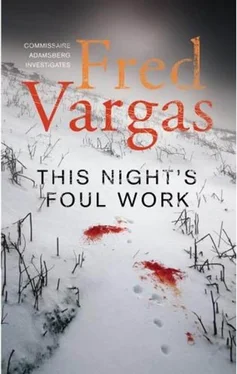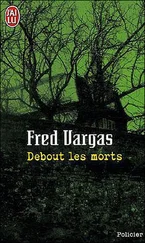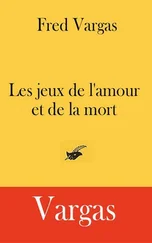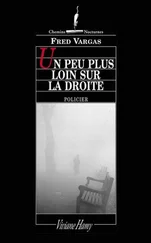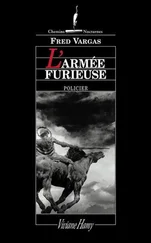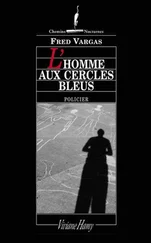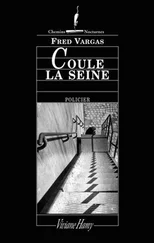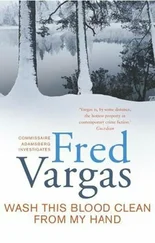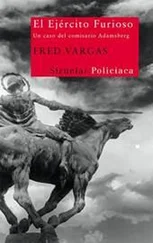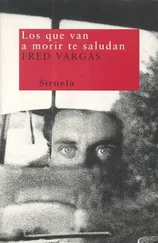‘As you like,’ Adamsberg replied with a shrug. ‘But talking of stones and water, there are two things to report, Danglard. First, I’ve got a ghost in my new house. A bloodthirsty and avaricious nun, who was killed by a tanner in 1771. He murdered her with his bare fists. Just like that. She’s taken up residence in a fluid sort of way in my attic. That’s the water.’
‘I see,’ said Danglard, prudently. ‘And the stones?’
‘I’ve seen the new pathologist.’
‘Elegant woman, bit stand-offish, but works hard at her job, they say.’
‘And very talented, Danglard. Have you read her thesis about murderers who are split in two?’
A pointless question, since Danglard had read everything, even the fire-evacuation instructions in hotel bedrooms.
‘On dissociated murderers, you mean,’ Danglard corrected. ‘Either Side of the Crime Wall . Yes, the book made quite a stir.’
‘Well, it turns out she and I had a major bust-up over twenty years ago, in a café in Le Havre.’
‘So you’re enemies?’
‘No, that kind of clash can sometimes create a close friendship. But I don’t advise you to go to a café with her – she mixes drinks that would knock out a Breton fisherman. She’s taken charge of those two men killed at La Chapelle. She seems to think a woman killed them. She’s going to refine her preliminary conclusions this evening.’
‘A woman?’
The usually languid Danglard sat up, in shock. He hated the idea that women might be killers.
‘Has she seen the size of those two guys? Is she joking?’
‘Not so fast, Danglard. Dr Lagarde doesn’t make mistakes, or hardly ever. Suggest her hypothesis to the Drug Squad, anyway – it’ll keep them off our backs for a bit.’
‘You won’t be able to hold Mortier off at all. He’s been getting nowhere with the dealer networks in Clignancourt-La Chapelle for months. It’s not looking good and he needs results. He’s called in twice already this morning. I warn you, he’s screaming blue murder.’
‘Let him scream. The water will win in the end.’
‘So what are you going to do?’
‘About my nun?’
‘No, about Diala and La Paille.’
Adamsberg looked at Danglard in bewilderment.
‘Those are their names,’ Danglard explained. ‘The two victims. Diala Toundé and Didier Paillot, known as “La Paille”. So should we go to the morgue tonight?’
‘No, I’m in Normandy tonight. For a concert.’
‘Ah,’ said Danglard, heaving himself to his feet. ‘You’re hoping for the points to change?’
‘I’m humbler than that, capitaine . I’m just going to look after the baby while she plays.’
‘Commandant , I’m a commandant now. Don’t you remember? You were at my promotion ceremony. What concert, anyway?’ asked Danglard, who always took Camille’s interests to heart.
‘It must be something important. It’s some British orchestra with period instruments.’
‘The Leeds Baroque Ensemble?’
‘It’s some name like that,’ said Adamsberg, who had never managed to learn a word of English. ‘Don’t ask me what she’s playing, I’ve no idea.’
Adamsberg stood up, and flung his damp jacket over his shoulder. ‘While I’m away, can you look after the cat, and Mortier, the two bodies, and the temper of Lieutenant Noël, who is getting more and more difficult? I can’t be everywhere, and duty calls just now.’
‘Since you’re being a responsible father,’ muttered Danglard.
‘If you say so, capitaine.’
Adamsberg accepted without demur Danglard’s grumbling reproaches which he considered almost always to be justified. A single parent, the commandant was bringing up his five children like a mother hen, whereas Adamsberg had hardly registered that Camille’s newborn baby was his. At least he had memorised his name: Thomas Adamsberg, known as Tom. That was at least one point in his favour, thought Danglard, who never completely despaired of the commissaire .
BY THE TIME HE HAD DRIVEN THE 136 KILOMETRES TO THE VILLAGE OF Haroncourt in the département of the Eure, Adamsberg’s clothes had dried in the car. He had only to smoothe them out by hand before putting on his jacket and finding a bar where he could wait in the warm for his prearranged rendezvous. Sitting comfortably on a battered leather banquette, with his back to the wall and a glass of beer in front of him, the commissaire examined the noisy group which had just taken possession of the café, rousing him from a semi-doze.
‘Want me to tell you what I think?’ said a big fair-haired man, pushing his cap back with his thumb.
He’s going to tell them anyway, thought Adamsberg.
‘Summat like that? Want me to tell you?’ the man was repeating.
‘We need a drink first.’
‘We do at that, Robert,’ said his neighbour, pouring out generous helpings of white wine into the six glasses.
So the big fair one was Robert – built like a wardrobe. And he was thirsty. It was the aperitif hour: heads sunk into shoulders, fists clenched around glasses, chins jutting at aggressive angles. The majestic hour, when the men of the village foregather and the angelus is rung, a time for sage opinions and nods of the head, a time for rural rhetoric, pompous and trivial. Adamsberg knew the score by heart. He had been born into this music, had grown up hearing its solemn developments, its rhythms and its themes, its variations and counterpoints, and he knew the players. Robert had sounded the first note on the violin, and all the other instruments would be moving into place at once, in an unvarying order.
‘Tell you what, though,’ said the man on Robert’s left. ‘It’s not just a drink we need after that. Makes you sick to your stomach.’
‘That it does.’
Adamsberg turned to have a better view of the last speaker, who had the humble but essential task of punctuating every turn in the conversation, as if on a double bass. He was small and thin, the least robust-looking of the group. That figured.
‘Whoever did that,’ said a tall stooped individual at the end of the table, ‘he’s no human being.’
‘No, he’s an animal.’
‘Worse than an animal.’
‘That he is.’
The first subject had been introduced. Adamsberg got out his notebook, still warped with rain, and started sketching the faces of the actors in the little drama. These were Norman heads, no mistake about it. He realised that they looked like his friend Bertin, a descendant of the god Thor, wielder of thunderbolts, who kept a café on a square in Paris. Square-jawed and high-cheekboned, fair-haired and blue-eyed, with an elusive expression in them. It was the first time Adamsberg had set foot among inland Normandy’s damp woods and fields.
‘What I think,’ Robert was saying, ‘is it’s some young fellow. Some nutter.’
‘Nutters aren’t all young.’
This contrapuntal interjection came from the oldest speaker at the head of the table. Alerted, the other faces turned his way.
‘Because when a young nutter grows up, he turns into an old one.’
‘Dunno about that,’ grunted Robert.
So Robert had the difficult but also essential task of contradicting the elder of the tribe.
‘I’m telling you they do,’ the older man said. ‘But say what you like, whoever did that, crazy’s the word all right.’
‘A savage.’
‘Stands to reason.’
Recapitulation and development of the first subject.
‘’Cos there’s killing and killing,’ said Robert’s neighbour, a man with hair less fair than the rest.
‘Dunno about that,’ said Robert.
Читать дальше
